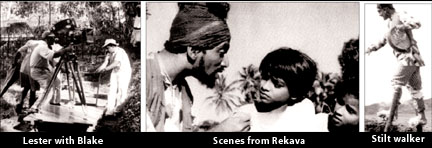|
observer |
|
|
|
|
|
OTHER LINKS |

|

|

|
|
Glimpse of History From ANCL Archives Fifty Years after Rekava...: Rekava - The Line of Density (1956)
"Rekava" which is considered as the first Sri Lankan artistic film, was followed by a sequence of productions by master filmmaker Dr.Lester James Peiris ; "Golu Hadawatha", "Akkara Paha", and "Nidhanaya". Undoubtedly Rekava marked a turning point in Sri Lankan cinema and salvaged it from the confines of studios. Earlier the Sinhala cinema was more or less similar to stage-plays and the language used in those productions was artificial and far from being realistic. Perhaps , it is Rekava that has changed this monotonous use of the camera and paved the way for Sri Lankan filmmakers to exploit the visual properties of the media to the maximum. Dr. Peiris would not have dreamt at the time of the production that Rekava will mark a defining phase of Sri Lankan cinema and that it would be a harbinger of a host of artistic films with Sri Lankan identity. Ananda Weerakoon, Malika Pilapitiya, Sesha Palihakkara, Somapala Dharmapriya,Irangani Serasinghe and Winston Serasinghe, D.R Nanayakkara and Martal Fernando (Child actor) were among the cast while Willie Blake and Titus Totawatte edited the film.
It is also a lesser known fact that the trio Lester James Peiris, Titus Totawatte and Willie Blake who is domiciled in Canada were working in the Government's Film Unit and they had to resign from their positions at the Government's Film Unit. Rekava is also important as it marked Gamini Fonseka's entry to Sri Lankan cinema as an assistant director though he played a minor role in Rekava. Rekava was shot in the village Veva in Allawwa and as in the story the village experienced a severe drought and the villagers blamed the film crew for the freakish draught. Especial equipments had to be brought down for the shooting and crackers were fired to get rid of the sound made by the crows. Apart from its artistic quality, Rekava goes down in Sri Lankan cinema as the first Sinhala feature film screened at the International Film Festivals. When it was first shown in London in 1956, the film was classified 'adults only'as it contained a scene where a child was slapped. The story Rekava is set in rural SriLanka then Ceylon. The film starts with a stilt walker cum musician arriving in the village of Siriyala. He has with him a monkey who performs various antics for the amusement of the public. Two thugs of the village Siriyala try to rob him . Sena, a young boy from the village prevents the robbery . In gratitude, the stilt walker, who is also an accomplished palm reader , volunteers to read the boy's palm and predict the future. He says that Sena will become a famous healer and bring dignity to the village.
His father who is a felon , with the notorious money lender of the village, seeks to exploit the situation for monetary gains .They organize a healing campaign to impress the villagers. A rich land owner brings his son for treatment, but unfortunately, the boy dies. The villagers are outraged; they assume that it is Sena's fault. To make matters worse, the village of Siriyala undergoes a huge drought. However finally, peace and tranquility return to the village of Siriyala. Rekava was hailed as an important work by film critics in SriLanka and was acclaimed and awarded at many international film festivals such as Cannes, Edinburgh, Karlovy Vary. The music for the film was by the legendary Sri Lankan musician Sunil Santha while the lyrics were composed by Rev. Fr. Merciline Jayakody. So it is no doubt that some of the songs are still played over the radio. Sisira and Indrani Senaratne rendered their melodious voice to the film. |
 As Rekava marks 50 years of its fisrt screening, it is pertinent to
look back on the path that Sri Lankan cinema lead from monotonous
productions entirely shot at studios to mega production like Anjalika.
As Rekava marks 50 years of its fisrt screening, it is pertinent to
look back on the path that Sri Lankan cinema lead from monotonous
productions entirely shot at studios to mega production like Anjalika.
 Though the legendary Sunil Shantha supplied the back up music for the
film , it was B. S. Perera who composed the music as Sunil Shantha
refused to fly to India where the film was processed.
Though the legendary Sunil Shantha supplied the back up music for the
film , it was B. S. Perera who composed the music as Sunil Shantha
refused to fly to India where the film was processed.  It also occurs that one day, when Sena and his friend Anula are
playing with a kite, Anula suddenly loses her eye sight. The village
native doctor was unable to restore Anula's sight. Sena touches her eyes
and miraculously Anula begins to see . As a result, Sena now gains a
reputation in the village Siriyala as the boy with a magical touch .
It also occurs that one day, when Sena and his friend Anula are
playing with a kite, Anula suddenly loses her eye sight. The village
native doctor was unable to restore Anula's sight. Sena touches her eyes
and miraculously Anula begins to see . As a result, Sena now gains a
reputation in the village Siriyala as the boy with a magical touch . 







